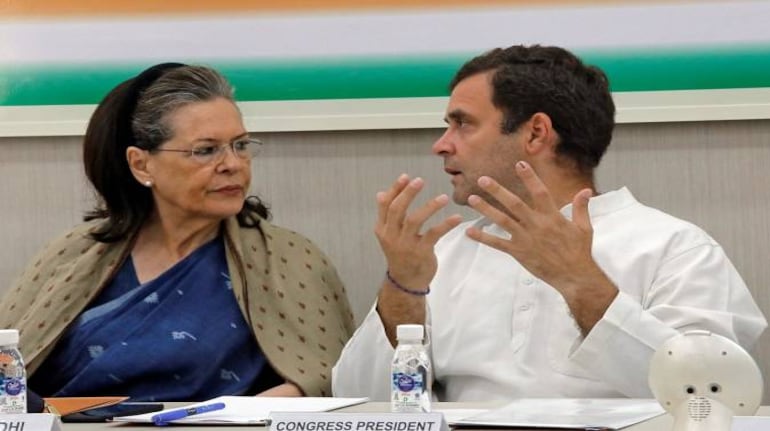



After three days of intense brainstorming, the Congress party on May 15 adopted what it called 'Udaipur Nav Sankalp Declaration' – a roadmap for wide-ranging changes in the grand-old party ahead of upcoming assembly polls and general elections.
Among the major takeaways were the thrust on re-establishing the lost connect with people, a resolution to take up organisational reforms, including ‘one-family-one-ticket’ and fielding those below 50 years of age in half of the seats from 2024 general elections
READ | Congress’ chintan shivir does little to bring ideological clarityThe meeting also reflected the party’s attempts to reach out to Dalits, Adivasis, and minorities. But there were some answered questions:
Of religion and ideologyLeaders such as Chhattisgarh Chief Minister Bhupesh Baghel wanted the party to celebrate Hindu festivals, something that leaders from the South were opposed to. The final resolution adopted by the Congress Working Committee (CWC), the party's highest decision-making body, however, did not mention the word religion. The party’s panel on political challenges suggested that the party should establish contact and engage with all social and cultural groups, NGOs, trade unions, think tanks and civil society groups.
The declaration reaffirmed the party’s commitment to pluralism as espoused by Mahatma Gandhi and Jawaharlal Nehru. Without referring to Hindutva, it stopped at condemning the Rashtriya Swayamsevak Sangh (RSS) and the BJP’s violent and divisive agenda. In her opening remarks, Congress President Sonia Gandhi lashed out at the Narendra Modi government for fanning communal tensions.
The leadership and G-23The party decided to put those under 50 into leadership roles at all organisational levels. The move is seen aimed at paving the way for Rahul Gandhi’s return as Congress president later this year. Yet, the issue of leadership remained unanswered. A leader even suggested Priyanka Gandhi should be made the president, if Rahul was unwilling to take the responsibility.
Also, read | Congress to field those below 50 in half of seats in Lok Sabha, state polls from 2024; to fix retirement age in legislaturesThere was no discussion on the demand of the G-23 group of dissenting leaders. None of the leaders who were the signatory of the letter to Sonia Gandhi seeking reforms spoke at the three-day event. Except Kapil Sibal, G-23 leaders such as Ghulam Nabi Azad, Anand Sharma, Mukul Wasnik, Bhupendra Singh Hooda and Manish Tiwari attended the event. Buzz has it that some of these leaders might get a Rajya Sabha berth.
“The Udaipur Chintan Shivir will go down in history as a case of missed opportunities. Be it the leadership vacuum, sweeping reforms, clarity over emotive issues or modernisation of the party, the deliberations and decisions were half-hearted, full of caveats and without the courage of conviction,” political analyst and author Rasheedd Kidwai wrote in India Today.
Sonia Gandhi announced the setting up of an advisory group but she said the group was not a “collective decision-making body”, a signal to the G-23 group that has been pushing for collective decision-making as one of the reform measures.
Congress leaders said that the three-day event in Rajasthan’s Udaipur added some ‘historical resonance.’
Also, read | Congress decides on key reforms to put house in order, resolves to re-establish lost connect with people
“The Chintan Shivir was many things rolled into one—from taking stock of our present to recalling the glory and gore of the past; determining to fight the toxic shadow of the incumbent Narendra Modi government to seriously analysing our ideological positions that suffered an erosion of support at the hands of the purveyors of fake miracles; committing ourselves to retrieve the missing national conversation to rededicating our lives to the revival of our party for the sake of true Indian democracy,” Congress leader Salman Khurshid wrote in The Print.
On AlliancesThe question of alliances was discussed at the three-day event but the declaration reflected a lack of unity within the Congress on the issue.
The declaration said that the Congress was open to engaging with like-minded parties for the purpose of electoral alliances but Rahul Gandhi, in his closing remarks, launched an attack on regional parties.
“It is not an easy battle. This battle can't be fought by a regional party. Because this is a battle between ideas - RSS' ideology is fighting against Congress' ideology…BJP never talks of regional parties, they only talk of Congress. Because BJP knows regional parties can't defeat them as they don't have an ideology," Gandhi said at the event.
Discover the latest Business News, Sensex, and Nifty updates. Obtain Personal Finance insights, tax queries, and expert opinions on Moneycontrol or download the Moneycontrol App to stay updated!
Find the best of Al News in one place, specially curated for you every weekend.
Stay on top of the latest tech trends and biggest startup news.